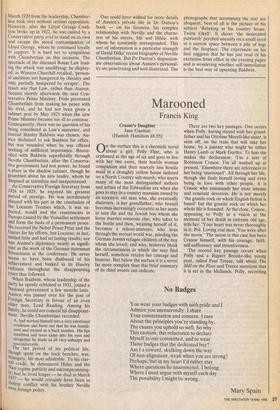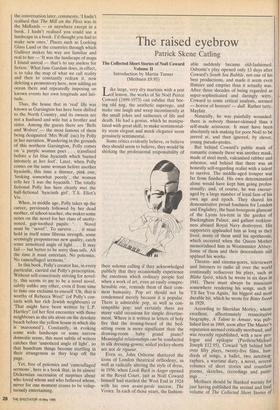Marooned
Francis King
Crusoe's Daughter Jane Gardam (Hamish Hamilton £8.95)
nn the surface this is a chronicle novel V about a girl, Polly Flint, who is orphaned at the age of six and goes to live with her two aunts, their hostile woman companion and their scarcely less hostile maid in a draughty yellow house isolated on a North Country salt-marsh; who meets many of the most distinguished authors and artists of the Edwardian era when she goes to stay in a country mansion owned by an eccentric old man who, she eventually discovers, is her grandfather; who herself becomes increasingly eccentric as her aunts in turn die and the Jewish boy whom she loves marries someone else; who takes to the bottle and then, weaning herself of it, becomes a school-mistress; who lives through the second world war, minding the German Jewish refugee children of the boy whom she loved; and who, however bleak the circumstances in which she may find herself, somehow retains her courage and humour. But below the surface it is a novel far more complex than this brief summary of its chief events can indicate.
There are two key passages. One occurs when Polly, having stayed with her grand- father and his Ottoline Morell-like sister, is seen off, on the train that will take her home, by a painter who might be either Henry Lamb or Mark Gertler. To him she makes the declaration: `I'm a sort of Robinson Crusoe. I'm all washed up at present.' Elsewhere there are references to her being 'marooned'. All through her life, though she finds herself loving and even being in love with other people, it is Crusoe who commands her most intense and constant devotion. He is not merely `the granite rock on which English fiction is based' but the granite rock on which her whole life is founded. At the close, Crusoe, appearing to Polly in a vision at the moment of her death in extreme old age, tells her: 'Your heart was never thoroughly in it, Pol. Loving real men. You were after the moon.' The moon in this case has been Crusoe himself, with his courage, faith, self-sufficiency and inventiveness.
The second key passage occurs when Polly and a Rupert Brooke-like young poet, called Paul Treece, talk about The Mill on the Floss and Treece mentions that it is set in the Midlands. Polly, recording the conversation later, comments: 'I hadn't realised that The Mill on the Floss was in the Midlands — or anywhere except in a book. I hadn't realised you could use a landscape in a book. I'd thought you had to make new ones.' Places such as Looking Glass Land or the countries through which Gulliver makes his way are familiar and real to her — 'It was the landscape of maps I found unreal — that's to say useless for fiction.' What Jane Gardam does, in effect, is to take the map of what we call reality and then to constantly redraw it, now deleting a promontory here, now adding an ocean there and repeatedly imposing on known events her own longitude and lati- tude.
Thus, the house that in 'real' life was known as Garsington has here been shifted to the North Country, and its owners are not a husband and wife but a brother and sister. Among the guests there are 'Bells and Wolves' — the most famous of them being designated 'Mrs Wolf(sic) by Polly in her narration. Wandering in the grounds of this northern Garsington, Polly comes on 'a purple woman poet . . . transfixed before a fat blue hyacinth which burned intensely at her feet'. Later, when Polly comes on the same woman before another hyacinth, this time a thinner, pink one,
`looking somewhat poorly', the woman tells her 'I was the hyacinth.' The totally fictional Polly has here clearly met the half-fictional 'hyacinth girl', T.S. Eliot's Viv.
When, in middle age, Polly takes up the career, previously followed by her dead mother, of school-teacher, she makes some notes on the novel for her class of snotty- nosed, gap-toothed pupils: . Novel must be "novel". To survive . . . it must hold in itself some fibrous strength, some seemingly preposterous new quality, catch some unnoticed angle of light . . . It may fail — but better to be sorry than safe. All the time it must entertain. No polemics. No camouflaged sermons.'
In this book, Polly's creator has, in every particular, carried out Polly's prescription.
Without self-consciously striving for novel- ty, this seems to me to be a novel novel, subtly unlike any other, even if from time to time one exclaims to oneself 'Oh, that is
worthy of Rebecca West!' (of Polly's con- tacts with her rich Jewish neighbours) or
`That might have been written by L.P. Hartley!' (of her first encounter with those neighbours as she sits alone on the desolate beach before the yellow house in which she is `marooned'). Constantly, in evoking some wide landscape or some narrow domestic scene, this most subtle of writers catches that 'unnoticed angle of light', so that humdrum things become startling in their strangeness as they leap off the page.
Yet, free of polemics and 'camouflaged sermons', here is a book that, in its almost Dickensian succession of surprises about who loved whom and who fathered whom, never for one moment ceases to be volup- tuously entertaining.















































 Previous page
Previous page